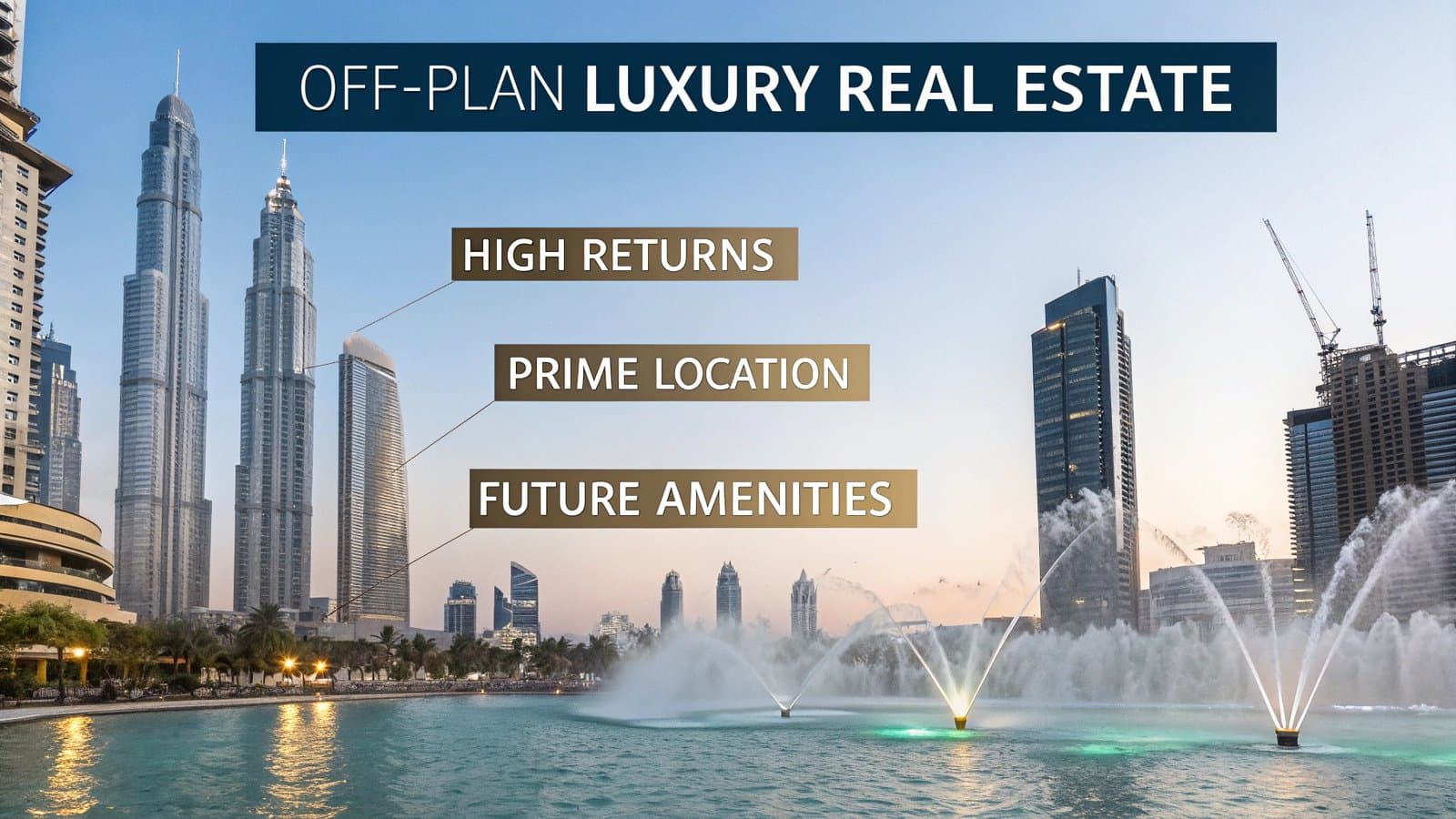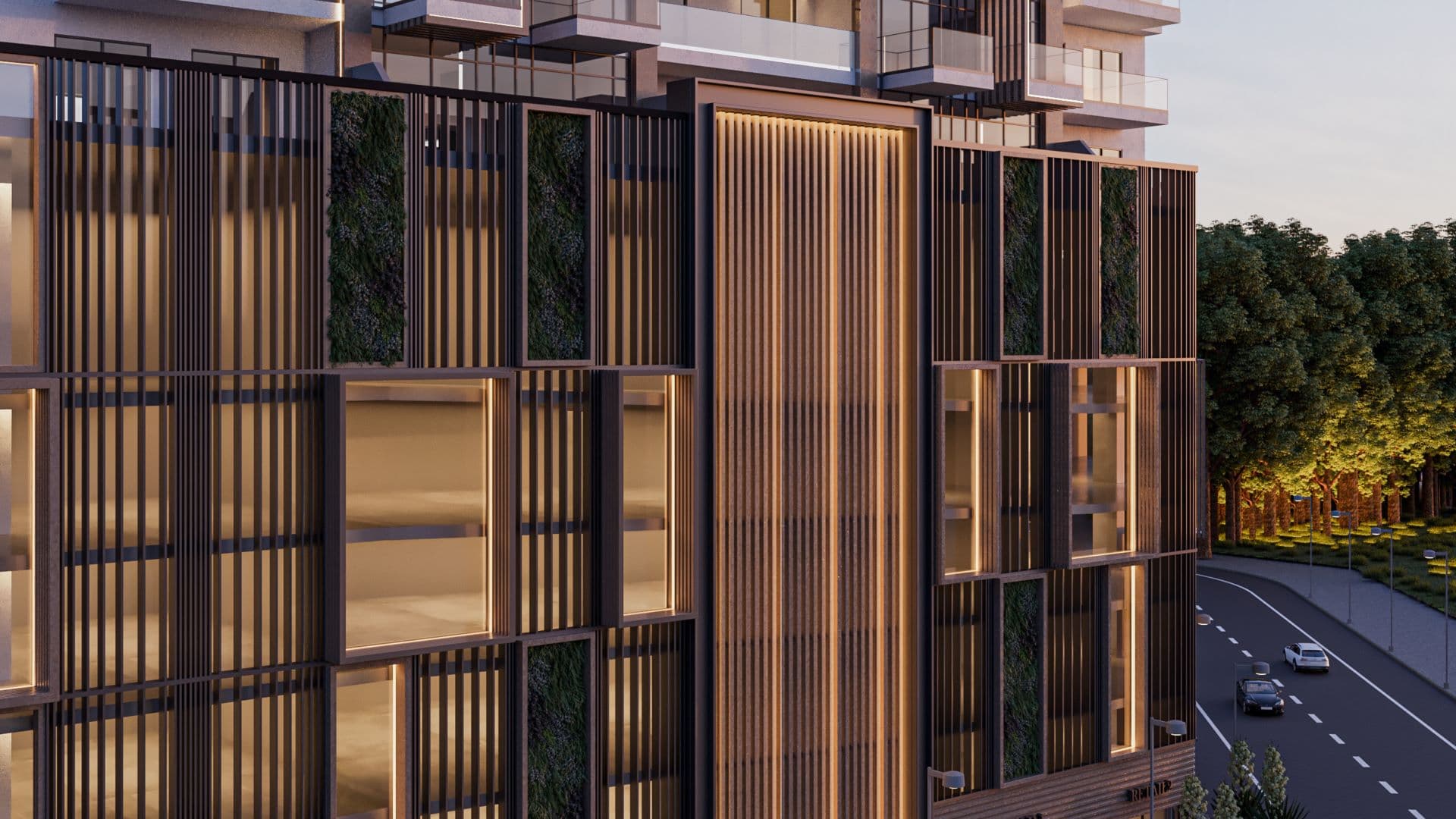Why Invest in Off-Plan Luxury Real Estate in Dubai?

Dubai’s real estate market has solidified its position as a global leader in luxury property investments, surpassing traditional hubs like London, New York, and Paris. In 2023, the city recorded 176 high-end property sales exceeding $10 million in just the first six months, generating nearly $850 million (AED 3.1 billion) in transactions. This remarkable growth underscores Dubai’s appeal as a hotspot for high-net-worth individuals (HNWIs) and savvy investors seeking high returns, portfolio diversification, and a luxurious lifestyle. Among the various investment avenues, off-plan luxury real estate Dubai stands out as a strategic choice, offering unique financial benefits, flexibility, and long-term growth potential.
Understanding Off-Plan Luxury Property Investments
What Are Off-Plan Properties?
Off-plan properties are real estate projects purchased before completion, often during the pre-construction or construction phase. In Dubai, these properties range from ultra-luxurious penthouses in Downtown Dubai to sprawling villas on Palm Jumeirah. Investors buy based on architectural plans, developer reputation, and market trends, securing units at lower prices compared to ready properties. This approach allows for significant capital appreciation as the project nears completion, especially in Dubai’s high-demand luxury market.
Why Choose Off-Plan Luxury Properties in Dubai?
Dubai’s luxury real estate market is driven by its strategic location, investor-friendly policies, and world-class infrastructure. Here are key reasons why off-plan luxury property in Dubai is an attractive investment:
High Capital Appreciation: Areas like Palm Jumeirah and Dubai Marina have shown average returns on investment (ROI) of 5.5%-8% due to limited supply and high demand.
Flexible Payment Plans: Developers often offer staggered payment schedules, allowing investors to pay 10%-20% upfront and the remainder over time, easing financial commitments.
Tax Advantages: Dubai’s tax-free environment, with no property or rental income taxes, enhances net returns for investors.
Golden Visa Benefits: Qualifying off-plan property investments (typically AED 2 million or more) grant investors a 10-year residency visa, adding long-term security.
Brand Prestige: Collaborations with luxury brands like Bulgari, Armani, and Jacob & Co. (e.g., Burj Binghatti Jacob & Co.) elevate property value and exclusivity.
Risks and Considerations
While off-plan investments offer significant rewards, they come with risks:
Construction Delays: Unforeseen delays can impact timelines, though reputable developers mitigate this risk.
Market Fluctuations: Global economic shifts may affect demand, requiring investors to stay informed.
Developer Reliability: Choosing trusted developers like Emaar, Damac, or Binghatti reduces risks associated with project completion and quality.
By partnering with experienced advisors, investors can navigate these challenges and maximize returns.
Dubai’s Luxury Real Estate Market: A Global Powerhouse
Market Overview
Dubai’s real estate market has transformed from a regional hub to a global powerhouse. In 2023, the city recorded AED 528 billion ($143.75 billion) in property transactions, with a 39% increase in deal volume compared to the previous year. The luxury segment, in particular, has seen unprecedented growth, with iconic projects like the Bulgari Lighthouse penthouse fetching AED 410 million ($111.6 million). Off-plan sales accounted for nearly 50% of transactions in the first half of 2023, reflecting strong investor confidence.
Prime Locations for Off-Plan Luxury Investments
Selecting the right location is critical for maximizing returns. Dubai’s prime areas for luxury real estate investment include:
Palm Jumeirah: Known for its beachfront villas and luxury residences, this man-made island offers high ROI and exclusivity.
Downtown Dubai: Home to the Burj Khalifa, this area attracts investors with high-end apartments and strong rental yields.
Dubai Marina: A vibrant waterfront destination with luxury apartments and a dynamic lifestyle.
Business Bay: Emerging as a mixed-use hub, ideal for investors seeking commercial and residential opportunities.
Emirates Hills: A gated community with bespoke villas, appealing to ultra-HNWIs.
Newer neighborhoods, such as Dubai Creek Harbour and Mohammed Bin Rashid City, are gaining traction for their innovative designs and growth potential.
Investor Demographics
Dubai’s luxury market attracts a diverse investor base, with top buyers from India, the UK, Russia, France, and the UAE, among others. The city’s investor-friendly policies, including 100% foreign ownership and zero income taxes, make it a magnet for global wealth.
Content Structure: The Pyramid Approach
The pyramid structure prioritizes high-impact information at the top, followed by detailed insights and supporting data:
Top (Core Message): Off-plan luxury properties in Dubai are a high-yield investment with significant capital appreciation, tax benefits, and lifestyle perks.
Middle (Supporting Details): Market trends, prime locations, developer profiles, and financial strategies.
Base (Comprehensive Data): Case studies, legal frameworks, financing options, and risk mitigation.
This structure ensures readability, engagement, and SEO performance.
Strategies for Investing in Off-Plan Luxury Properties
1. Research and Due Diligence
Developer Reputation: Choose developers with a proven track record, such as Emaar (Burj Khalifa, Dubai Creek Harbour) or Binghatti (Burj Binghatti Jacob & Co.).
Project Viability: Assess the project’s location, amenities, and completion timeline. Verify legal permits and escrow accounts to ensure compliance.
Market Analysis: Use data-driven insights from platforms like Emirates.Estate to evaluate demand and pricing trends.
2. Financing Options
Developer Payment Plans: Many developers offer 60/40 or 70/30 payment plans, with 10%-20% due upfront and the balance paid post-handover.
Mortgages: Dubai banks provide competitive mortgage rates for off-plan properties, often with 50%-70% loan-to-value ratios for expats.
Fractional Ownership: For smaller investors, fractional ownership or Real Estate Investment Trusts (REITs) offer access to luxury properties with lower capital requirements.
3. Exit Strategies
Flipping: Sell the property upon completion to capitalize on price appreciation.
Renting: Leverage high rental yields (5%-8%) in areas like Dubai Marina and Downtown Dubai.
Holding: Retain the property for long-term capital growth, especially in emerging neighborhoods.
4. Leveraging Technology
AI and Analytics: Use AI-driven platforms like the Web Platform Neural Network (WPNN) for personalized market insights and predictive analytics.
Virtual Tours: Engage international buyers with 360-degree virtual tours and AR previews to showcase off-plan properties.
Blockchain: Utilize blockchain for secure title transfers and transparent transactions.
Local Insights: Why Dubai Stands Out
Economic and Cultural Appeal
Dubai’s strategic location as a global trade hub, coupled with its cultural diversity, attracts investors from over 100 countries. The city’s zero-tax policy, robust infrastructure, and world-class amenities (e.g., private beaches, golf courses) enhance its appeal.
Government Initiatives
Golden Visa Program: Investors purchasing properties worth AED 2 million or more qualify for a 10-year residency visa, fostering long-term commitment.
Free Zones: Areas like Dubai International Financial Centre (DIFC) offer 100% foreign ownership and tax exemptions, ideal for commercial off-plan investments.
Sustainability Focus: Projects like Dubai Creek Harbour emphasize eco-friendly designs, aligning with global trends and attracting environmentally conscious investors.
Lifestyle Benefits
Luxury properties in Dubai offer unmatched amenities:
Branded Residences: Properties like Bulgari Lighthouse and Armani Residences provide exclusivity and prestige.
Smart Homes: Off-plan projects incorporate AI-driven home automation, appealing to tech-savvy buyers.
Tourist Appeal: Vacation homes in areas like Palm Jumeirah generate high rental income during peak seasons.
Case Studies: Successful Off-Plan Investments
Case Study 1: Bulgari Lighthouse, Jumeirah Bay
In 2023, a penthouse in the Bulgari Lighthouse sold for AED 410 million, highlighting the demand for branded residences. Investors who purchased off-plan units in 2021 saw capital appreciation of over 30% by completion, driven by the project’s exclusivity and prime location.
Case Study 2: Emaar’s Creek Harbour
Emaar’s Dubai Creek Harbour has attracted investors with its sustainable designs and waterfront views. Off-plan buyers in 2020 benefited from 25% price growth by 2023, alongside rental yields of 6%-7%.
Legal and Financial Considerations
Legal Framework
Escrow Accounts: Dubai’s Real Estate Regulatory Authority (RERA) mandates escrow accounts for off-plan projects, ensuring funds are protected until completion.
Sale and Purchase Agreement (SPA): Review clauses for penalties, completion timelines, and dispute resolution.
Title Transfer: Blockchain technology streamlines title transfers, enhancing transparency.
Financing and Costs
Upfront Costs: Expect 10%-20% down payments for off-plan properties, with service fees and maintenance costs post-handover.
ROI Calculations: Factor in capital appreciation, rental yields, and tax benefits to project returns.
Advisory Services: Partner with firms like MHG Wealth or NetConsult for tailored investment strategies.
Future Trends in Dubai’s Luxury Real Estate
Sustainability and Smart Homes
Dubai’s focus on sustainability is shaping off-plan projects. Developments like Dubai Creek Harbour incorporate green building standards, appealing to eco-conscious investors. Smart home features, such as AI-driven lighting and security, are becoming standard in luxury properties.
Emerging Neighborhoods
Areas like Mohammed Bin Rashid City and Dubai South are gaining traction for their innovative designs and infrastructure investments, offering high growth potential for early investors.
Global Investor Interest
With foreign investment in Dubai’s real estate growing by 28% in recent years, the market continues to attract HNWIs from Europe, Asia, and Africa.
Unlocking Wealth Through Off-Plan Luxury Investments
Investing in off-plan luxury real estate Dubai offers a unique blend of high returns, tax advantages, and lifestyle benefits. By targeting prime locations like Palm Jumeirah, Downtown Dubai, and Dubai Marina, and partnering with trusted developers like Emaar and Binghatti, investors can maximize capital appreciation and rental yields. A strategic approach—combining thorough research, financing options, and digital marketing—ensures success in this dynamic market.
